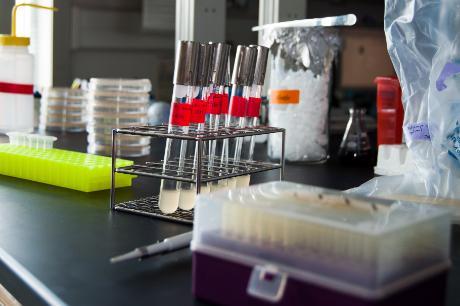Faculty Research Programs
The Department has specific research strengths in Molecular/Cell Biology, Molecular Neurobiology, Developmental Biology, Invertebrate Population Genetics, Plant Insect Interactions, Conservation Biology, and Evolutionary Ecology and Morphology of Animals. The research themes below are listed from most molecular to most behavioral. Because of the interdisciplinary nature of biology, several faculty are listed under multiple themes.

Molecular/Cell Biology
Faculty: Edwards, Wightman, Cuadra
Research within this theme answers questions about the biochemical and genetic underpinnings of cell physiology. Using DNA technology, several faculty focus their research goals on the regulation of gene function by chromatin in eukaryotes, the cellular basis of pathogenicity in the mosquito-borne LaCross Virus, the molecular genetics of development in C. elegans, and microbial-host interactions.
Molecular Neurobiology
Faculty: Wightman
Research in this theme is complementary to the College-wide interdisciplinary program in neuroscience. Research questions include the function of nuclear receptors in the transcriptional regulation of neuron development and neuronal signaling pathways.
Developmental Biology
Faculty: McCain, Wightman
An emerging research question in biology is understanding how cells learn or acquire their final fate during development. Labs in this theme are examining the regulation of nuclear hormone receptors in C. elegans, developmental processes that serve as a model for cancer research, and using electron microscopy to understand cell fate choice in marine invertebrates.

Conservation Biology
Faculty: Klem, Niesenbaum
The Department has distinctive research strength in conservation biology which is complementary to the College program in Environmental Science. Research in this theme has examined the success of sustainable development in Guatemala and Costa Rica, Armenian ornithology, and human-related wildlife mortality. Conservation biology has benefited from strong collaborative ties with the department of Sociology. Research facilities include a state-of-the-art GIS (Geographic Information Systems) laboratory on campus.
Evolutionary Ecology and Morphology of Animals
Faculty: Iyengar, Klem
The Department has outstanding and historical strength in understanding the ecology and behavior of animals in the field. Research in this theme seeks to understand the social and reproductive behavior of frogs (Rana sylvatica) and woodchucks (Marmota monax), the feeding ecology and kleptoparasitic behavior of marine snails ( Trichotropis cancellata ) , and defense in stream insects and snails. Students have also pioneered projects examining the gross and histological anatomy of the avian alimentary tract.
